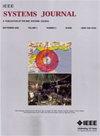智能互联异构车辆队列的差分私有非周期采样数据一致性
IF 4.4
3区 计算机科学
Q1 COMPUTER SCIENCE, INFORMATION SYSTEMS
引用次数: 0
摘要
本文在实现差分隐私保护的同时,以平均输出共识实现了连接邻居之间非周期采样数据信息交换下的车辆队列。首先,将复杂的车辆动力学系统简化为通过通信图相互连接的异构线性系统。随后,部署了一个分布式混合控制器,专门用于处理间歇性采样数据信息,并增加了一个动态噪声发生器。该框架将信息交换限制在预定义的邻近车辆集合中。为了保证差分隐私,设计并加入服从拉普拉斯分布的随机噪声,其中衰减指数和控制增益是可调参数,分别对应于期望的隐私级别和系统精度。这种噪声注入是由差分隐私噪声利用算法引导的。然后,将极点放置法与广义逆概念相结合,制定并求解了控制器设计,实现了有效的网络化控制。最后,给出了仿真实例,严格验证了所提出的理论框架,证明了其在保持车队一致性的同时保护单个车辆数据隐私的有效性。本文章由计算机程序翻译,如有差异,请以英文原文为准。
Differentially Private Aperiodic Sampled-Data Consensus for Intelligent Interconnected Heterogeneous Vehicular Platoons
In this article, the vehicular platoons under aperiodic sampled-data information exchange between connected neighbors are implemented with an average output consensus while achieving differential privacy protection. Initially, the complex vehicle dynamics system is simplified into a heterogeneous linear system interconnected through a communication graph. Subsequently, a distributed hybrid controller is deployed, specifically tailored for handling the intermittent sampled-data information, and is augmented with a dynamic noise generator. This framework restricts information exchange to a predefined neighborhood set of vehicles. To ensure differential privacy, design and incorporate random noise adhering to a Laplace distribution, where the decay index and control gain are adjustable parameters corresponding to the desired privacy level and system accuracy, respectively. This noise injection is guided by a differential privacy noise utilization algorithm. The controller design is then formulated and solved using a combination of the pole placement method and the generalized inverse concept, enabling effective networked control. Lastly, simulation examples are provided to rigorously validate the proposed theoretical framework, demonstrating its efficacy in maintaining platoon coherence while preserving the privacy of individual vehicle data.
求助全文
通过发布文献求助,成功后即可免费获取论文全文。
去求助
来源期刊

IEEE Systems Journal
工程技术-电信学
CiteScore
9.80
自引率
6.80%
发文量
572
审稿时长
4.9 months
期刊介绍:
This publication provides a systems-level, focused forum for application-oriented manuscripts that address complex systems and system-of-systems of national and global significance. It intends to encourage and facilitate cooperation and interaction among IEEE Societies with systems-level and systems engineering interest, and to attract non-IEEE contributors and readers from around the globe. Our IEEE Systems Council job is to address issues in new ways that are not solvable in the domains of the existing IEEE or other societies or global organizations. These problems do not fit within traditional hierarchical boundaries. For example, disaster response such as that triggered by Hurricane Katrina, tsunamis, or current volcanic eruptions is not solvable by pure engineering solutions. We need to think about changing and enlarging the paradigm to include systems issues.
 求助内容:
求助内容: 应助结果提醒方式:
应助结果提醒方式:


